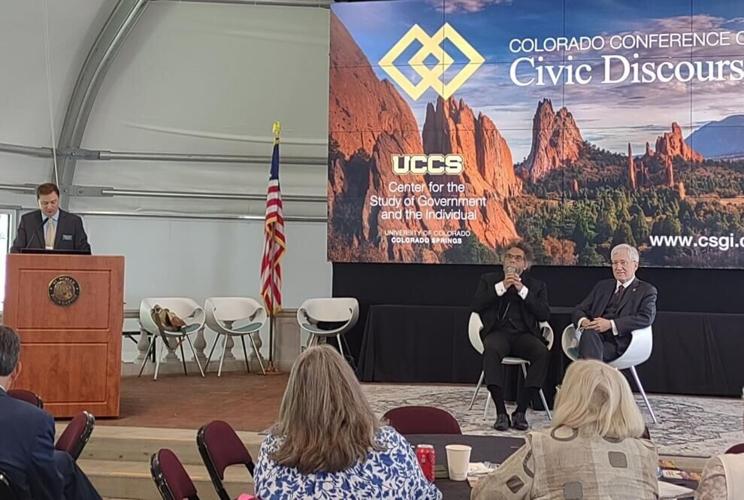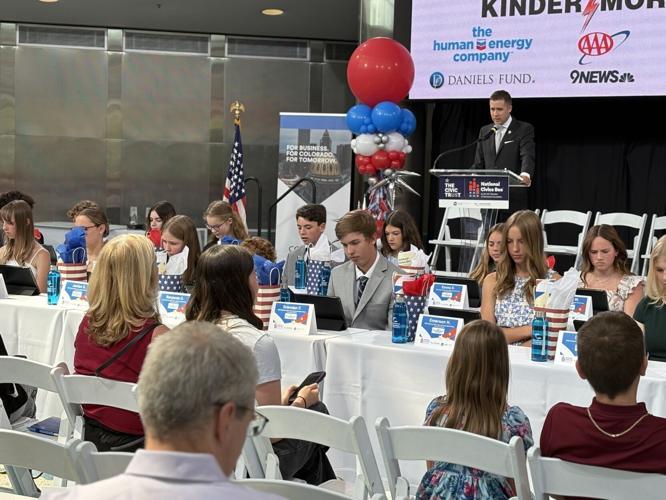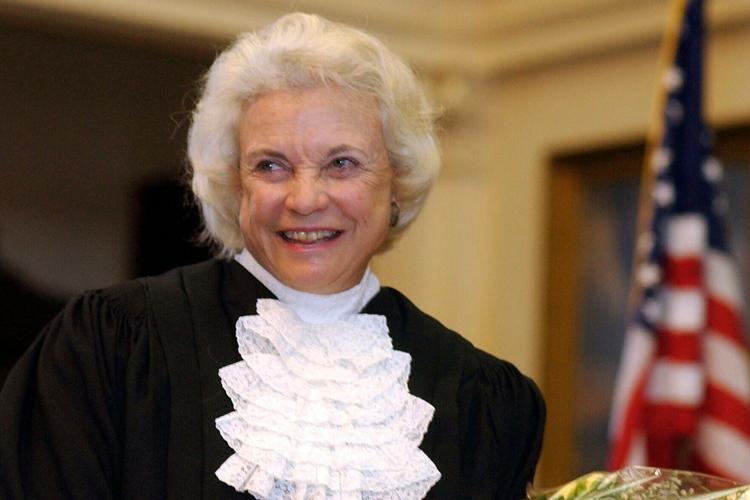Americans may be seeing the first glimmers of a civic revival | Vince Bzdek

Steven Pittz introduces keynote speakers Cornel West and Robert George at Penrose House during the Colorado Conference on Civic Discourse on June 5. {span class=”credit”}{span id=”author-bd9f16a6-bec3-11ee-9b11-5f8813bd056c-asset-e47c81ac-255d-4b4c-b265-28f8e8a076fd” class=”tnt-byline asset-byline”} {/span}{/span}
Eric Young, The Gazette
Two weeks every June in Boston, you’ll find thousands of young folks between 12 and 25 gathering in schools, parks, malls and libraries to practice the art of democracy.
Thanks to the mayor, young Bostonians get to decide how nearly $1 million of the city’s budget should be spent, a process called participatory budgeting. Volunteers track down young people in their haunts and engage them to vote on a list of budget priorities that many of those same young people helped to craft.
“With participatory budgeting, the community decides how to solve their own problems,” David Beasley, spokesman for the Participatory Budgeting Project, told the Philadelphia Citizen. “They can get at the root causes that others don’t see.”
Those young Bostonians, for example, decided to spend $250,000 on a roving resource truck to help youth find jobs, $100,000 on a digital billboard conveying information to homeless youth, and another $260,000 on a mobile retail space for young entrepreneurs. They also voted for much better city Wi-Fi.
They had real power to make real decisions about real money.
But here’s the realest benefit: Those Boston kids got a hands-on crash course in civic participation, a subject that has been woefully missing from our curriculums in recent years, not to mention society in general.
“You’re creating a more educated platform of voters overall,” Christine Petro, a volunteer facilitator in Boston, said during a video interview for PBP. “So I think this can be good for the big project of democracy,”
The big project of democracy could use any help it can get right now.
At a recent Conference on Civic Discourse at the University of Colorado Colorado Springs, political scientist Steven Pittz made the point that civic knowledge has been in precipitous decline.
“According to the U.S. Chamber [of Commerce], more than 70% of Americans fail a basic civic literacy quiz on topics like the three branches of government, the number of Supreme Court justices and other basic functions of our democracy,” he said.
“Just half were able to name the branch of government where bills become laws. And 1 in 3 did not know there were three branches of government.
“You can’t fix what you don’t understand.”
Political scientist Robert Cropf of St. Louis University seconded that notion. “Before we can rebuild our civic muscle, we must first take honest stock of what’s been lost,” he said in an interview. “Over the past two decades, America’s civic infrastructure has eroded — not with a bang but with a quiet, steady unraveling.
“Churches have emptied. Local newspapers have disappeared, and neighborhood associations have faded. The public square didn’t vanish overnight; it was slowly neglected, hollowed out, and in many places, deliberately dismantled.
“Some places still have strong local networks, full of volunteers and community spirit,” he noted. “But far too many Americans live in civic deserts — places without local news, working town halls or trusted institutions.”
But things like the conference in Colorado Springs and the participatory budget gatherings in Boston are giving political scientists like Pittz and Cropf hope.
“We can’t romanticize what’s gone,” Cropf wrote recently. “But we can start reimagining what a civic revival might look like in the world we actually live in.”
If the problem is civic decay, the solution has to be civic repair. “This requires not only financial support from public and private sources, but also a deeper investment of time and effort by ordinary citizens who choose to engage in their communities,” Cropf wrote in a series of articles recently.
“If we can somehow establish some sort of bipartisan consensus that certain things can work and we need to invest in our civic infrastructure, then I think there is cause for long-term optimism,” he told me.
A host of nonprofits and grassroots organizations are springing up to channel this hunger for a better civic life, nonpartisan groups like Generation Citizen, iCivics, the Center for Civic Education, Citizen University, The National Civics Bee and The Civic Trust, Civic News Co., Philanthropy for Active Civic Engagement, and the Disagree Better initiative launched by the National Governors Association and fully embraced by Gov. Jared Polis. There’s even a new series of TED Talks on empowering civic participation.
“I think there’s real, real potential,” Cropf said, “for some concrete engagement going forward.”
Cropf also sees glimmers of hope for a revival of adult civic education in cities like Baltimore, with initiatives like The Baltimore Banner, Chicago’s City Bureau and Block Club Chicago, and Fresnoland, in Fresno, Calif., which are all pioneering nonprofit news models that aim to restore public trust and fill the reporting gaps left by shuttered legacy outlets.
Startups like The Denver Gazette in 2020 and Colorado Politics in 2016 are part of that revival.
We also need better civic education.
“When I teach my students in Intro to American Government, a lot of them haven’t had a civics course at all,” Cropf said.
Groups like iCivics, launched by late Supreme Court Justice Sandra Day O’Connor, and Generation Citizen are filling the gaps by teaching not just how government works, but practical skills for dialogue, debate and community action.
“These nonprofits tend to, in a generic way, they fill in that gap we’re talking about as civics has been sidelined in schools,” Cropf said. An emphasis on testing, and a raft of competing priorities are probably responsible for that sidelining, even though our founders created the public school system with the sole intention of forging well-informed citizens.
The next step, once this civic revitalization movement gets fully going, is probably finding ways to root these groups into their communities.
“And we need physical spaces — libraries, union halls, community centers,” Cropf said. “These are the gyms where democracy gets exercised.”
This is where in-person events and gatherings like the civic festival in the Springs, participatory budgeting in Boston, and youth organizing hubs come in.
“I think you can do some organizing online and you can get the word out through social media, but ultimately there has to be that face-to-face interaction,” Cropf said. “People across political divides and whatever other divides need to get in the same place physically and talk to each other and do things together.”
Government of, by and for people “is about practicing deliberative virtues, recognizing that self-government requires difficult conversations and continuous debates about a shared political future,” Pittz said.
“I don’t think that many people would argue that in our current climate, emotional intensity and tribalism have the upper hand. We’re in need of that renewal today.”
Pittz thinks Colorado might have a better chance than most states in sparking a civic revival.
“Colorado is a state of transplants,” he noted. ”And I’m wondering if this sort of unsettled nature in Colorado and the Rocky Mountain West isn’t also an opportunity. It should in theory at least respond better to our deliberate interventions.
“Perhaps that leaves us with an opportunity that what we are able to do in meetings like this … and through efforts that I know many people in this room are in organizations doing … is have a real chance of making a difference.”
But joining one event like the one in the Springs or a single participatory budgeting exercise in Boston isn’t enough. Cropf is hoping the upcoming 250th birthday of our nation next year might spur a more self-sustaining civic renewal.
“True citizenship is something that is learned, and it must be renewed with every generation,” Pittz concluded at the Springs conference. “It’s a process of continual renewal.”
Vince Bzdek, executive editor of The Gazette, Denver Gazette and Colorado Politics, writes a weekly news column that appears on Sunday.







